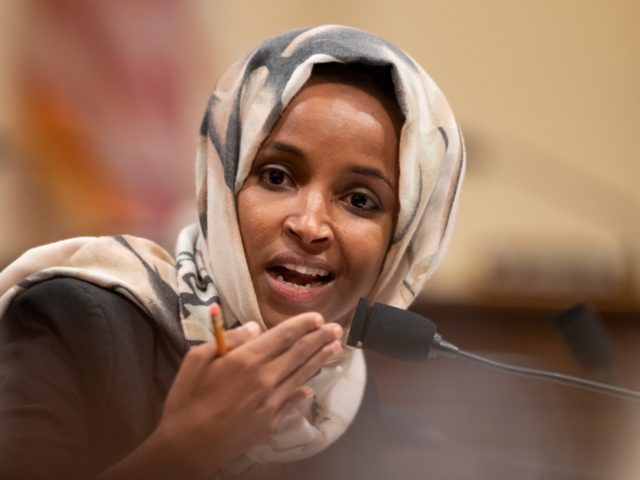Far-left “Squad” member Rep. Ilhan Omar (D-MN) dismissed concerns of the overall cost of implementing a government-run healthcare system in the United States, stating “we can afford Medicare for All.”
Omar responded to a New York Times op-ed, which essentially argues the U.S. should cut military spending and instead use the money to pay for the costly Medicare for All system.
According to the op-ed:
Over 18 years, the United States has spent $4.9 trillion on wars, with only more intractable violence in the Middle East and beyond to show for it. That’s nearly the $300 billion per year over the current system that is estimated to cover Medicare for All (though estimates vary).
While we can’t un-spend that $4.9 trillion, imagine if we could make different choices for the next 20 years.
We’ve identified more than $300 billion in annual military savings alone that we could better invest in priorities like Medicare for All, working with a national grassroots movement called Poor People’s Campaign.
“We can afford Medicare for All,” Omar wrote. “What we cannot afford is losing more lives to endless wars and a health insurance industry that profits off sickness”:
While estimates tend to vary, one from the Mercatus Center at George Mason University assessed that the government-run healthcare system would cost $32 trillion over the next decade alone and would require massive tax increases. It would ultimately result in a “transformative change in the size of the federal government,” according to the study’s author Charles Blahous.
As Breitbart News reported:
Blahous argues that the estimates for the $32 trillion price tag are relatively conservative because they assume that Sanders’ bill achieves its goals of reducing payments to health providers, as well as lowering drug prices and administrative costs.
The Mercatus Center suggested that doubling federal individual and corporate income tax would not cover the costs of the “Medicare for all” plan.
However, Blahous later testified before the House Rules Committee’s hearing on Medicare for All and said the federal government’s total spending on a government-run healthcare system could top $60 trillion over the next decade.
As Breitbart News reported:
Blahous said that the $32 trillion price tag was too conservative and that given historical spending levels on health care, net new federal spending would likely increase spending by $38.8 trillion over the next ten years and would increase federal healthcare spending to 13 to 15 percent of the Gross Domestic Product (GDP).
The Mercatus scholar also noted that the Medicare for All’s total federal spending price over the next ten years would amount to between $54.6 trillion and $60.7 trillion.
Blahous mentioned that “doubling individual and corporate income taxes would be insufficient to finance even the lower bound” of the $32.6 trillion in new federal spending.
Most Americans, 64 percent, are opposed to paying more in taxes to implement Medicare for All, according to a Locust Street Group released in August.
Omar’s position follows her endorsement of socialist Sen. Bernie Sanders (I-VT), who remains a fierce proponent of a single-payer system. Sanders has been extremely forthcoming on how he would pay for the implementation of the multi-trillion dollar proposal, openly admitting that taxes will go up for middle class Americans but arguing that overall “cost” will go down as premiums are erased. The latter is an argument Sen. Elizabeth Warren (D-MA) has made repeatedly, but she has yet to explicitly say if she would raise taxes on middle class Americans to pay for Medicare for All.
“What our bill does … what people should understand is that what Medicare for All does is eliminates your private health insurance premiums. You’re not going to be paying that, you’re not going to be paying co-payments, you’re not going to be paying deductibles,’ Sanders told Iowa CBS affiliate KCCI in May.
“You’re going to be seeing your prescription drug cost, in my view, come down by 50 percent. Will you be paying more in taxes? Yes, you will,” he added.
Cost, however, is not the only concern. Opponents of Medicare for All also point to bureaucratic mismanagement and argue that a government-run healthcare system will result in a sharp decline in overall quality of care.

COMMENTS
Please let us know if you're having issues with commenting.